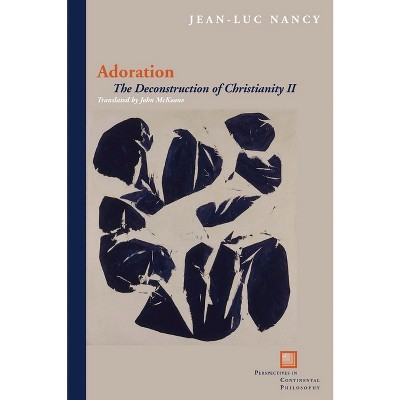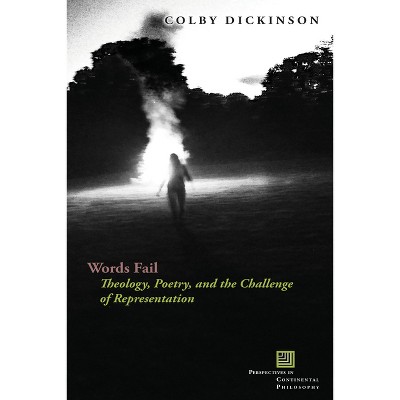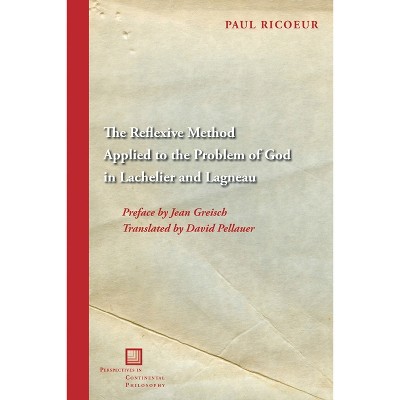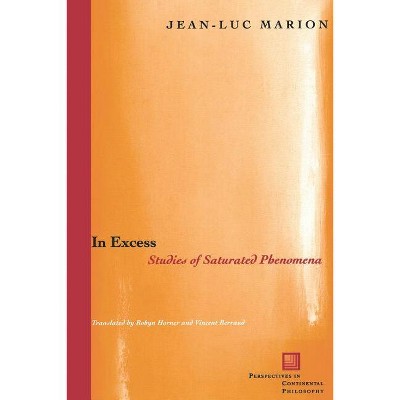Trials - (Perspectives in Continental Philosophy) by William Robert (Hardcover)

$72.99 when purchased online
Target Online store #3991
About this item
Highlights
- What does it mean to be called "human"?
- About the Author: William Robert is Assistant Professor in the Department of Religion at Syracuse University.
- 136 Pages
- Religion + Beliefs, Philosophy
- Series Name: Perspectives in Continental Philosophy
Description
About the Book
What does it mean to be called human? How does this affect or effect what it means to be called divine? This book responds to these questions in intertwined explorations of the passionate trials of Antigone and Jesus. Impelled by her love of the impossible, Antigone crosses uncrossable boundaries, confounds distinctions of nature and culture, and unearths and critiques the sexism implicit in humanism.The mode of humanity she develops offers a new way of considering Jesus. Through a close reading of Mark's gospel focused on Jesus' cry of abandonment from the cross, the author shows that to refigure humanity is also to refigure divinity and their relation.In the first extended treatment of Nancy's Corpus in English, the author proposes an innovative account of Jesus' humanity and divinity-one that can contribute to religious understandings of embodiment and prayer and can open avenues of inquiry into tragedy, sexual difference, posthumanism, and politics.Book Synopsis
What does it mean to be called "human"? How does this nomination affect or effect what it means to be called "divine"? This book responds to these related questions in intertwined explorations of the passionate trials-examinations, tests, and ordeals-of Antigone and Jesus. Impelled by her love of the impossible, Antigone crosses uncrossable boundaries, transgresses norms of kinship and mortality, confounds distinctions of nature and culture, and, in the process, unearths and critiques the sexism implicit in humanism.
Antigone thus disrupts humanist traditions stretching from Sophocles to Martin Heidegger-traditions that would render her subhuman or inhuman. She survives these exclusions and engenders a new mode of humanity, one that destabilizes classic oppositions of life and death and affirms mortal finitude in the face of the future's unforeseeability. This new mode of humanity offers a new way of considering Jesus, whom Christianity identifies as human and divine. Building on his reading of Antigone, the author, through a close reading of Mark's gospel focused on Jesus' cry of abandonment from the cross, shows that to refigure humanity is also to refigure divinity and their relation. In the first extended treatment of Jean-Luc Nancy's Corpus in English, the author draws on the theoretical insights of Jacques Derrida and Nancy to propose an innovative account of Jesus' humanity and divinity-one that can contribute to religious understandings of embodiment and prayer and can open avenues of inquiry into tragedy, sexual difference, posthumanism, and politics. By pairing Antigone and Jesus and engaging the work of Judith Butler, Simone Weil, Jean-Louis Chrétien, and Dominique Janicaud, this book constructively participates in interdisciplinary conversations at the nexus of religious, philosophical, literary, and gender studies.Review Quotes
Explores a new mode of humanity engendered in the tragedy of the Greek heroine and applies it to a consideration of Jesus, as he is seen by believers as both mortal and divine.-- "--The Chronicle of Higher Education"
In this provocative, highly readable pairing of the trials of Sophocles' Antigone and Mark's Christ, William Robert makes innovative use of well-known theorists, notably Jacques Derrida and Jean-Luc Nancy. The juxtaposition allows for the emergence of intriguing and sometimes unexpected parallels as the author theorizes trial, tragedy, the nature of human subjectivity, and the complex relation of human to divine.-----Karmen MacKendrick, Le Moyne College
In wonderfully resonant language, William Robert has written a book that deserves to be read carefully and attentively by students of Religious Studies, Philosophy, Classics, and anyone interested in the inheritance of two figures that have shaped Occidental life and thought in countless ways: Antigone and Jesus. Jesus and Antigone emerge as models of survival, of living on after being forsaken by God (Jesus' "My God, My God, why have you forsaken me?") and abandoned by Man (Antigone's living death or death in life). Informed by a deep understanding of Jacques Derrida, Jean-Luc Nancy, and other important continental philosophers, Robert puts to the test two tries at a postdivine humanity and a posthuman divinity anticipated by Antigone and Jesus.-----Jeffrey L. Kosky, Washington & Lee University
About the Author
William Robert is Assistant Professor in the Department of Religion at Syracuse University.Dimensions (Overall): 9.0 Inches (H) x 6.1 Inches (W) x .8 Inches (D)
Weight: .8 Pounds
Suggested Age: 22 Years and Up
Number of Pages: 136
Genre: Religion + Beliefs
Sub-Genre: Philosophy
Series Title: Perspectives in Continental Philosophy
Publisher: Fordham University Press
Format: Hardcover
Author: William Robert
Language: English
Street Date: May 7, 2010
TCIN: 94292401
UPC: 9780823231652
Item Number (DPCI): 247-16-0041
Origin: Made in the USA or Imported
Shipping details
Estimated ship dimensions: 0.8 inches length x 6.1 inches width x 9 inches height
Estimated ship weight: 0.8 pounds
We regret that this item cannot be shipped to PO Boxes.
This item cannot be shipped to the following locations: American Samoa (see also separate entry under AS), Guam (see also separate entry under GU), Northern Mariana Islands, Puerto Rico (see also separate entry under PR), United States Minor Outlying Islands, Virgin Islands, U.S., APO/FPO
Return details
This item can be returned to any Target store or Target.com.
This item must be returned within 90 days of the date it was purchased in store, shipped, delivered by a Shipt shopper, or made ready for pickup.
See the return policy for complete information.











